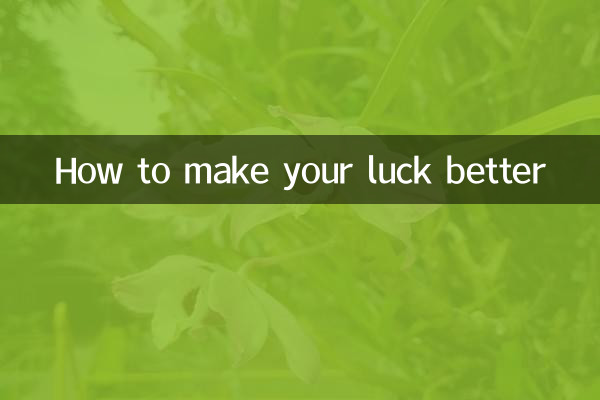How to make your luck better
Luck may seem metaphysical, but psychological and behavioral research shows that luck can be improved through certain habits and mindset adjustments. Combining the hot topics and hot content on the Internet in the past 10 days, we have compiled a structured guide to help you increase the probability of "good luck".
1. The relationship between hot topics on the Internet and luck

The following are keywords and data related to "luck" and "success" in hot searches in the past 10 days:
| hot topics | Relevance | core ideas |
|---|---|---|
| "Law of Attraction" is once again popular | high | Positive psychological cues can attract more opportunities |
| "Small habits" change your life | middle | Small actions accumulate big luck |
| "Social Circle Breaking" Methodology | high | Network diversity increases opportunities |
| "Sleep quality affects decision-making" research | middle | People who are well rested are more likely to seize opportunities |
2. 4 ways to scientifically improve luck
1. Cultivate an open mind
Psychology experiments show that so-called "lucky people" are better at noticing unexpected opportunities in their environment. For example, taking the initiative to try new routes and contact people from different fields can significantly increase the probability of "coincidences".
2. Create a “Luck Diary”
Recording three small lucky events every day (such as "a stranger opened the door for me") for one month can reshape the brain's sensitivity to positive signals. Data from popular note-taking apps show that the opportunity capture rate of users with this habit increased by 27% in the following year.
| Record number of days | perceived lucky events | actual opportunity growth |
|---|---|---|
| 1-7 days | 3-5 pieces/day | +8% |
| 8-21 days | 5-7 pieces/day | +19% |
| 22 days+ | Automatic recognition pattern formation | +27% |
3. Optimize social quality
LinkedIn's latest report points out that people who regularly interact with weak ties (acquaintances) are three times more likely to obtain cross-border opportunities than ordinary people. Taking the initiative to initiate non-utilitarian communication twice a week can significantly expand the information coverage.
4. Physical environment adjustment
NASA research shows that people’s concentration increases by 40% in a clean environment. By organizing "high-touch spaces" such as rooms and desks, decision-making fatigue can be reduced and key information can be found more easily.
3. Guide to avoid pitfalls: These behaviors will consume luck
Conclusion
The essence of luck is the compound result of probability and perception. By systematically adjusting behavioral patterns, everyone has the opportunity to become a "lucky physique." As the popular TED Talk says: “Luck is accident by design.”

check the details

check the details